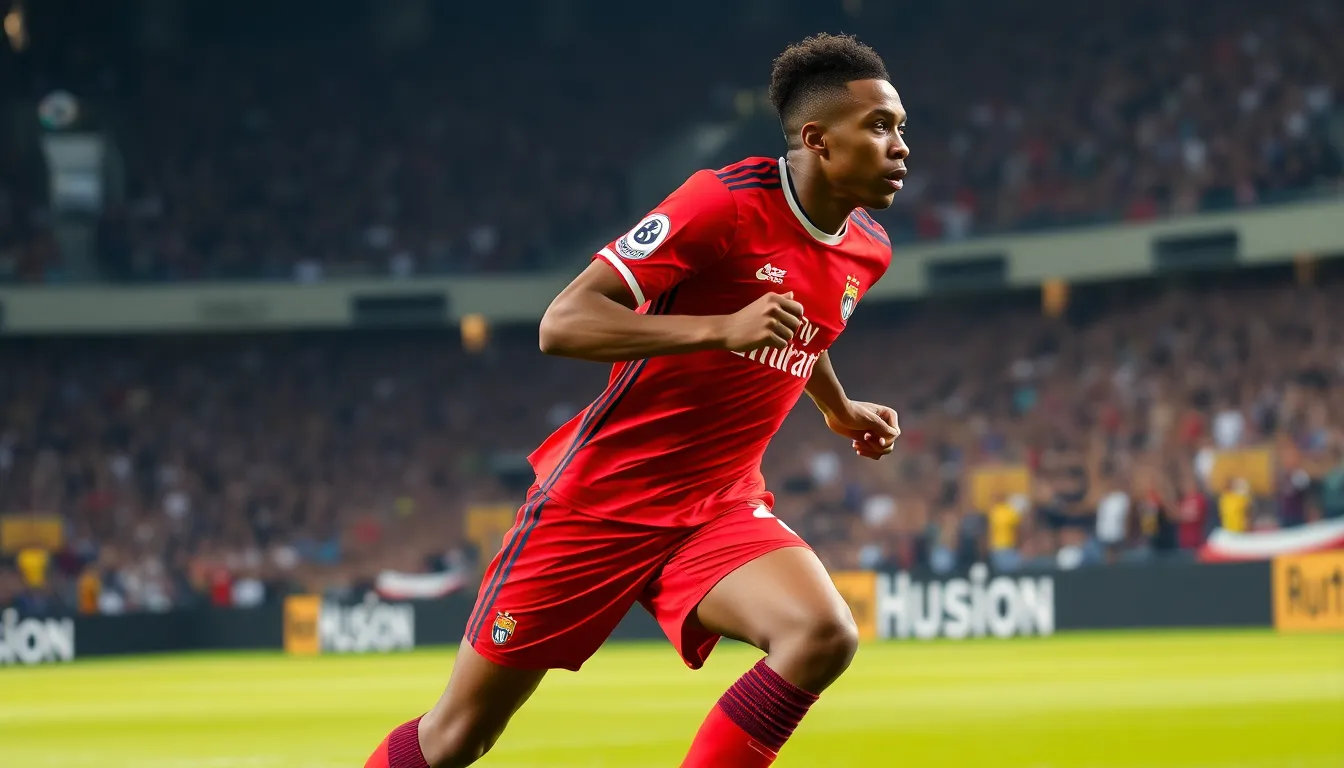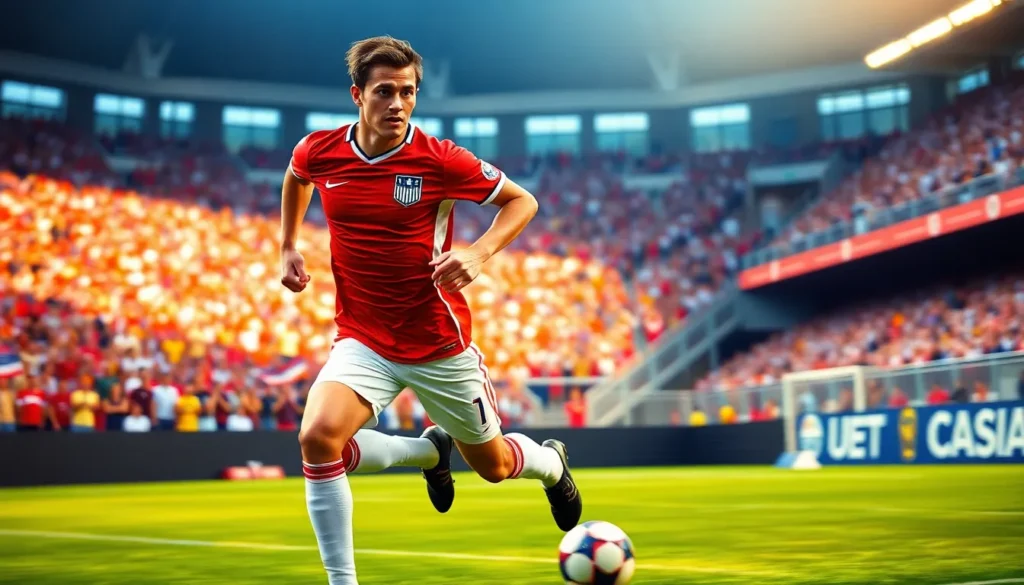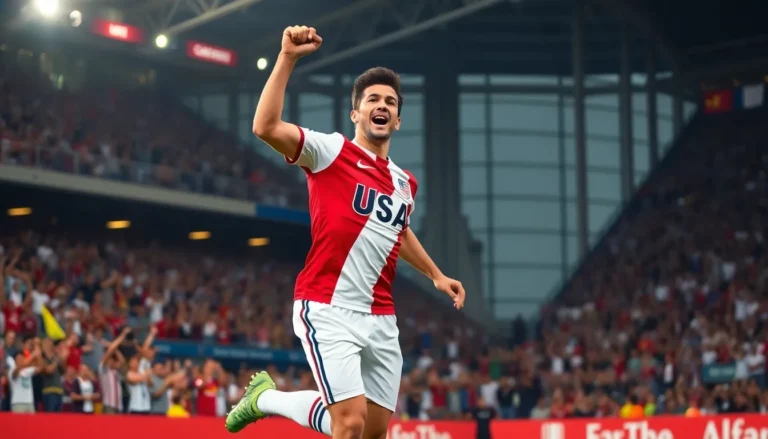Table of Contents
ToggleIn the world of FIFA, speed isn’t just an advantage; it’s a game-changer. Picture this: a player darting across the pitch like a cheetah on roller skates, leaving defenders in the dust and fans gasping in awe. Fast players can turn a mundane match into a thrilling spectacle, and if you’re a fan of beautiful game, you know exactly what that feels like.
Overview Of FIFA Fastest Players
Speed plays a crucial role in FIFA, with the fastest players significantly impacting gameplay. These athletes excel at outpacing defenders, creating scoring opportunities, and delivering thrilling moments that captivate fans. Among notable players, Kylian Mbappé stands out, clocking in at 36.08 kilometers per hour during a match. His remarkable speed adds a dynamic element, allowing him to break through defensive lines with ease.
Adama Traoré ranks highly as well, reaching top speeds of 34.42 kilometers per hour. This pace, combined with his strength, makes him a formidable presence on the field. Both players exemplify how speed is a game changer in high-stakes scenarios.
Additionally, players like Alphonso Davies and Timo Werner demonstrate that sprinting ability contributes not only to individual success but to team performance. Alphonso, with speeds of 36.51 kilometers per hour, enhances his team’s offensive strategies and defensive recoveries. Timo’s quickness allows him to exploit spaces, further emphasizing the value of speed in modern football.
Research by FIFA also highlights that fast players improve a team’s overall tactical flexibility. Coaches increasingly prioritize speed in player recruitment, recognizing how vital it is for winning crucial matches. In summary, the presence of these exceptionally fast players in FIFA enhances entertainment value and elevates competitive play.
Top FIFA Fastest Players In Recent Editions

Speed plays a pivotal role in FIFA, allowing players to outmaneuver opponents and create scoring chances. The fastest athletes in this series showcase incredible attributes that enhance their performance on the field.
Key Attributes Of Speed
Acceleration defines how quickly a player reaches full speed. Sprint capacity refers to the maximum speed a player can maintain while running. Agility complements speed, enabling players to change direction swiftly. Explosiveness helps in launching forward from a standstill position, further boosting their potential. Endurance ensures that fast players maintain their pace throughout the game. These attributes combine to produce dynamic and electrifying gameplay, elevating the overall excitement of matches.
Player Rankings Across Editions
Kylian Mbappé ranks among the fastest, clocking in at 36.08 kilometers per hour. Adama Traoré follows closely with a top speed of 34.42 kilometers per hour. Alphonso Davies and Timo Werner also make the list, showcasing speeds that significantly influence matches. Other notable players, such as Achraf Hakimi and Mohamed Salah, display impressive sprinting capabilities, further emphasizing speed’s importance in FIFA. Rankings fluctuate with each edition based on player performance and new statistics released by FIFA, keeping fans engaged with the latest developments in player capabilities.
Impact Of Speed In FIFA Gameplay
Speed plays a crucial role in FIFA gameplay, transforming matches through the actions of fast players. Quick athletes generate excitement and unpredictability.
Strategies For Utilizing Fast Players
Coaches prioritize strategies that capitalize on speed. Formations often include wingers and strikers who can exploit defensive gaps. Using swift players on counterattacks creates space for quick transitions. Through dribbling and sprinting, they can break through opposing defenses. Teams often rely on speed for creating scoring opportunities, drawing defenders away from key positions.
Real-World Implications Of Speed
Speed impacts real-world soccer tactics as teams adapt to the fast-paced nature of modern gameplay. Coaches emphasize quick movements and sharp passes, enhancing overall team dynamics. Fast players contribute to higher scoring rates, as seen with athletes like Kylian Mbappé. FIFA research shows that teams with faster players enjoy increased tactical flexibility. Ultimately, successful clubs invest in training programs focused on speed development to maintain competitive advantages.
Essential Skills To Complement Speed
Quickness alone doesn’t guarantee success on the field. Players must master essential skills that enhance their speed, making them more effective.
Dribbling ability ranks among the top skills. Fast players like Kylian Mbappé use superior dribbling to navigate through defenders. Effective ball control and precise touches contribute to maintaining speed while maneuvering.
Passing accuracy stands out as another crucial skill. A fast player without the ability to deliver accurate passes risks losing opportunities. Precise passing allows quick players to create scoring chances for teammates, emphasizing teamwork in their speed-focused playstyle.
Defensive awareness is equally important. Speedy players often find themselves in positions to intercept or challenge opponents. Developing situational awareness enables fast athletes to predict plays and react swiftly, turning defense into offense.
Physical strength shouldn’t be overlooked. Speed becomes more impactful when paired with the ability to hold off defenders. Strong players like Adama Traoré exhibit this combination effectively, using physicality to maintain control while outrunning competitors.
Fitness and endurance play essential roles. Being able to sustain speed throughout the match is vital for maximizing impact. Fast players must maintain stamina to ensure they can perform at high levels consistently, especially in demanding game situations.
Tactical intelligence also rounds out the skill set. Understanding when to utilize speed within a formation allows players to exploit defensive weaknesses. Fast athletes adapt their movements based on game flow, ensuring their speed aligns with team strategies.
Mastering these skills not only complements speed but also elevates a player’s overall game. Collectively, they enhance gameplay, making fast athletes even more formidable on the pitch.
Speed in FIFA isn’t just a statistic; it’s a game-changer. Fast players like Kylian Mbappé and Adama Traoré redefine matches with their ability to outpace defenders and create scoring opportunities. Their presence on the field adds excitement and unpredictability, captivating fans and influencing game strategies.
As teams adapt to modern gameplay, the emphasis on speed continues to grow. Coaches now prioritize quickness in player recruitment and formation design. However, speed must be paired with essential skills for maximum impact. Mastering dribbling, passing, and tactical awareness ensures that fast players can effectively navigate the complexities of the game.
Ultimately, the integration of speed into soccer not only enhances individual performance but also elevates the overall quality of play, making every match a thrilling spectacle.







